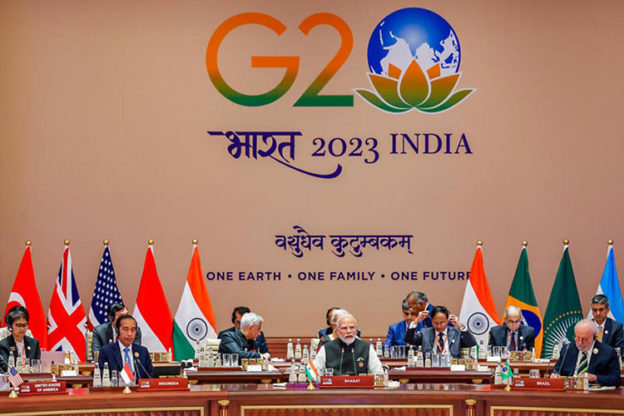The G20 countries will be focusing on strengthening primary health care and health workforce and improving essential health services and health systems to better than pre-pandemic levels, ideally within the next 2-3 years.
The G20 Summit 2023, hosted by India, comes to an end on Sunday. The biggest highlight was that the G20 New Delhi Leaders’ Declaration was adopted and the members of the G20 arrived at a “100% consensus” on the opening day of the Summit on Saturday.
While Prime Minister Modi described the development as “historic and pathbreaking”, there were lingering disagreements regarding the Ukraine conflict and climate change action.
On the health front, after facing the burn of the disastrous COVID-19 pandemic, the declaration emphasises future pandemic preparedness and the improvement of essential health services and systems.
“As Leaders of G20, the premier global forum for international economic cooperation, we resolve to act in concrete ways through partnerships. We commit to: Improve access to medical countermeasures and facilitate more supplies and production capacities in developing countries to prepare better for future health emergencies,” the declaration revealed.
The global leaders committed to strengthening the global health architecture, with the World Health Organization (WHO) at its core, and building more resilient, equitable, sustainable, and inclusive health systems to achieve Universal Health Coverage, implement One Health approach, enhance pandemic preparedness and strengthen existing infectious diseases surveillance systems.
According to the New Delhi Declaration, the member countries will be focusing on strengthening primary health care and health workforce and improving essential health services and health systems to better than pre-pandemic levels, ideally within the next 2-3 years. Alongside, they will also be focusing on progress towards polio eradication and ending ongoing epidemics including AIDS, tuberculosis, malaria, hepatitis and water-borne and other communicable diseases.
It is noteworthy that the countries also prioritised the impact of long Covid and recognised the importance of research on many yet-to-be-known aspects of the post-covid infection effects.
The countries will also promote the One Health-based approach driven by the Quadripartite’s One Health Joint Plan of Action (2022-2026). The G20 nations will also enhance the resilience of health systems, support development of climate-resilient and low-carbon health systems in collaboration with MDBs, and support the work of the WHO-led Alliance for Transformative Action on Climate and Health (ATACH).
Moreover, the countries have also given consensus to implement and prioritise tackling Antimicrobial Resistance (AMR) following the One Health approach, including through research and development, infection prevention and control, as well as antimicrobial stewardship efforts within respective national action plans through AMR and antimicrobial consumption surveillance.
It is noteworthy that India has already taken the lead in vaccine manufacturing and research on antimicrobial resistance (AMR).
Meanwhile, the G20 countries will also facilitate equitable access to safe, effective, quality-assured, and affordable vaccines, therapeutics, diagnostics, and other medical countermeasures, especially in Low-and Middle-income Countries (LMICs), LDCs and SIDS.
The countries also agreed to recognise the potential role of evidence-based Traditional and Complementary Medicine in health, and take note of international efforts in this direction, including WHO’s global and collaborating centres, and clinical trial registries.
Last month, on the sidelines of G20 Health Ministers’ meeting under G20 India Presidency in Gujarat, WHO Chief Tedros Adhanom Ghebreyesus said India has a rich history of traditional medicine.
Tedros, during the World Health Organisation Traditional Medicine Global Summit which was held parallel to the G20 health ministers’ meeting, added that traditional medicines are being sought by countries to deal with non-communicable diseases, mental health, and treatment of many other ailments.
According to the New Delhi Declaration, the countries have also pledged to support the WHO-led inclusive consultative process for the development of an interim medical countermeasures coordination mechanism, with effective participation of LMICs and other developing countries, considering a network of networks approach, leveraging local and regional R&D and manufacturing capacities, and strengthening last mile delivery.
The countries will also be promoting and improving access to mental health services and psychosocial support in an inclusive manner.
While highlighting the public health dimension of the world drug problem, the countries called for strong international counter-narcotics cooperation, free of unnecessary restrictions, including information sharing and capacity building to disrupt production and proliferation of illicit drugs, including synthetic drugs, and precursor chemicals at their origin, in transit and at destination points.
“We remain committed to strengthening the global health architecture for pandemic prevention, preparedness and response (PPR) through enhanced collaboration between Finance and Health Ministries under the Joint Finance and Health Task Force (JFHTF). Under the JFHTF, we welcome the participation of invited key regional organisations in the Task Force meetings as they enhance the voice of low-income countries. We welcome the discussion on the Framework on Economic Vulnerabilities and Risks (FEVR) and the initial Report for Economic Vulnerabilities and Risks arising from pandemics, created through collaboration between World Health Organisation (WHO), World Bank, IMF, and European Investment Bank (EIB),” The joint declaration by G20 leaders stated.
The countries also called on the Task Force to continue refining this Framework over its multi-year work plan in order to regularly assess economic vulnerabilities and risks due to evolving pandemic threats, taking into account country-specific circumstances.
“…We highlight the importance of securing new donors and co-investment. We ask the Task Force to report back to Finance and Health Ministers in 2024 on its progress,” it added.
On Sunday, PM Modi proposed a virtual session of the G-20 around the end of November to take stock of the suggestions and decisions made at the leaders’ summit. During the concluding session, Modi handed over the gavel and offered best wishes to Brazil for the presidency. Brazil officially will take over the mantle of the presidency of the Summit on December 1 this year.
The G20 Summit, hosted by India, was the eighteenth meeting of G20. It was held at Bharat Mandapam International Exhibition-Convention Centre, Pragati Maidan, New Delhi on 9–10 September 2023. It was the first G20 summit held in India as well as in South Asia.
https://www.financialexpress.com/healthcare/news-healthcare/g20-summit-2023-world-leaders-pledge-to-implement-one-health-approach-improve-accessibility-and-prioritise-antimicrobial-resistance/3238910/





